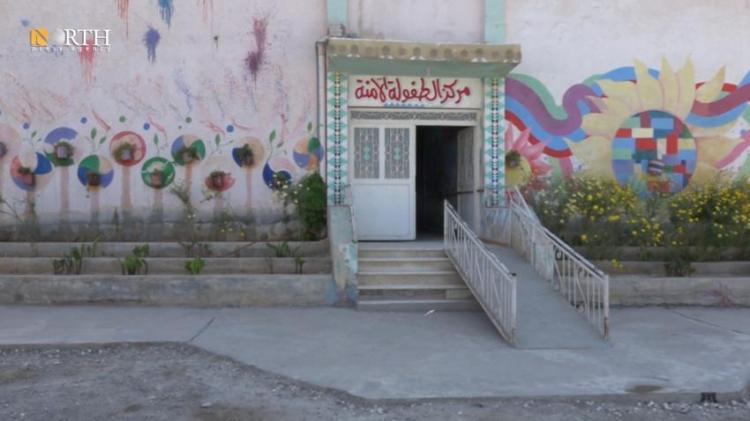Raqqa – North-Press Agency
Mustafa al-Khalil
Hamed Adnan al-Feteih, a displaced person from the city of Deir ez-Zor who lives in a rented house in al-Sakhani neighborhood in the city of Raqqa in northern Syria, is following up on the situation of his niece Ayat al-Feteih after obtaining the educational videos through the WhatsApp application on his phone from the teacher in charge of students with hearing disabilities at the Future Makers Center in Raqqa.
Ayat, who suffers from a hearing problem since she was born, was pursuing her education in the hearing disability department at the Future Makers Center until the suspension of work at the center on March 23 and the curfew imposed by the Autonomous Administration of North and East Syria.
In conjunction with the curfew, the teachers at the Safe Childhood Center of the Future Makers Organization (a non-governmental organization) in Raqqa for people with special needs resorted to recording lessons through the cameras of their mobile phones to be sent via WhatsApp to the parents of children with special needs.
The new method of teaching has caused difficulties for children with special needs who, in normal circumstances, need special attention and care, although it provides follow-up lessons and training for the children under direct supervision of each child's family inside their houses.
Wissam al-Ali, a psychosocial support coach and protection official at the Safe Childhood Center, told North Press that there are several disadvantages to the method of distance education and sending educational videos through WhatsApp application for the parents of the children, due to the living conditions of their parents and frequent internet and electricity outages, and sometimes the total absence of a phone through which the educational videos are sent.
The Safe Childhood Center, which is located in al-Mashlab neighborhood east of Raqqa city, was opened by the Future Makers Team on July 14, 2018, where it first included a number of children with special needs in addition to other children.
For his part, director of the Safe Childhood Center in Raqqa Ahmad al-Mousa told North Press that after the lockdown they had two options: either the children would continue their lessons within the center, something impossible in light of the lockdown, or that children would remain in their houses. Because of this, they endure some psychological stress and insufficient response to the method of distance education, in addition to not having proper access to lessons.
Al-Mousa added that distance education by sending videos cannot not reach all the children registered in the center, because of “the lack of response by the parents to this idea and the shortage of the internet. Also, it is less feasible than the normal method of education before the imposition of the lockdown.”
Before the lockdown, the Safe Childhood Center hours was open from 8:00 in the morning to 12:00 in the afternoon, and children were going to and from the center by car.

